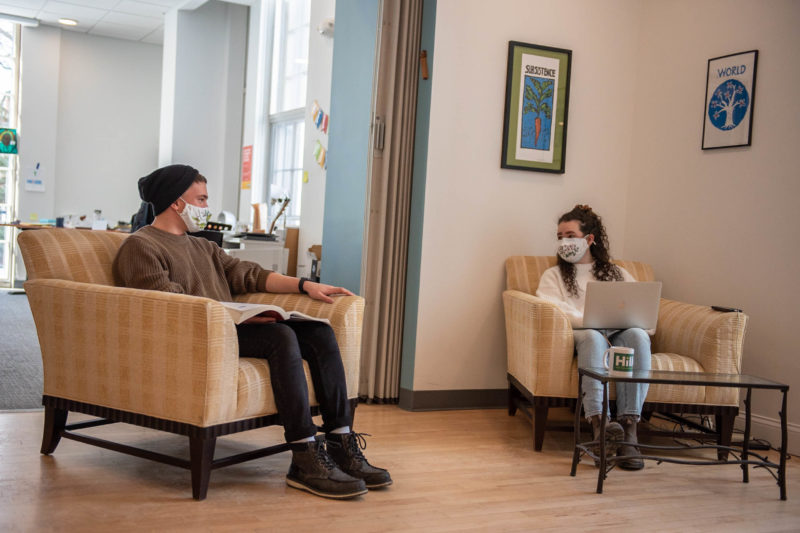Opinion
mutual aid
I’ll be your queer Rabbi If you’ll be my Russian Jew
In Short
In cities across America, mutual aid has been at the heart of our pandemic survival
“Queer rabbi seeks Russian Speaking Hillel professional for a mutually beneficial relationship.” It sounds like a bad posting on a dating app but it’s actually an invitation to use mutual aid to ensure every person who seeks Jewish life can find a local community where they feel seen and included.
In cities across America, mutual aid – the voluntary, reciprocal, exchange of resources – has been at the heart of our pandemic survival. Not just a tool for shoring up our social safety net, mutual aid can help us reimagine our organizations to meet present and future needs.


Courtesy Hillel International
Over the last five years, Hillel International has invested significantly in weaving thick connections among Hillel professionals working with college students around the world. When it comes to inclusion, this thick network is a strategic advantage: No individual Hillel is large enough to have staff that represent the full diversity of their Jewish student body. But together, as a movement, we absolutely do. The challenge is how to leverage our diverse staff across geographic distance and disparate campus cultures to ensure that every student has the opportunity to connect with a mentor, teacher or guide in whose story they can see their own, and through whose Jewish leadership they can imagine their future within our community.
At Drexel Hillel, we’ve noted with frustration that we are less able to build community with students whose personal identities, practices and experiences don’t mirror our staff members and educators. We have staff with one Jewish parent, queer staff, staff from Reform and Conservative backgrounds and we do well engaging students of similar experiences. We don’t have staff whose family hails from the Former Soviet Union, or who are Orthodox, Persian or Mizrahi, and that can mean we do less well serving those communities.
Prior to the pandemic, if you had asked me how to solve that problem I would have said spend more money. Hire for more diversity, add a staff member, maybe a few scholar-in-residence programs. The results would be an improvement, but expensive and incomplete at best. And in the “time before,” Hillel staff, especially those who couldn’t spend more money, partially bridged gaps by sharing best practices and engaging in professional development.
Since the pandemic, the rapid acculturation of our communities to video conferencing combined with a deep sense of shared responsibility renewed by our trying times has offered another option: a mutual aid approach to sharing staff time. When each of us offers a few hours of staff time to other campuses to serve our underrepresented students, every campus is in a position to leverage the expansive diversity of the Hillel professional staff network to serve the full diversity of our population. It’s an approach that maximizes existing resources and can help us ensure that every Jewish student, regardless of background, beliefs, abilities or experiences, has access to Jewish guides, teachers and mentors whose stories feel relevant to them.
This approach is already taking shape at Drexel and on other campuses. During the pandemic, Drexel Hillel joined a network of campuses participating in the Russian Speaking Jewish Student Internship program, funded by the Genesis Philanthropy Group. It was inspiring to watch our Russian-speaking Jewish student intern work directly with a Russian-speaking staff mentor from another Hillel, connecting so quickly and comfortably with someone who shares their experience, their language and their culture. It reconfirmed the need for student access to diverse staff and opened our organization to new ways of thinking about sharing staff resources with other Hillels. It made me think, what can my staff offer to other campuses in a similar way? How can we create a culture of this sort of mutual aid across Hillel?
This winter, hearing a need from students on campuses without LGBTQ+ identified staff, I decided to share my own experiences and expertise as a queer identified rabbi, designing and facilitating short-term learning community for LGBTQ+ students from across the country through the Hillel International WinterFest project. Nearly 20 students from seven different campuses came together for a month to explore the legacies of our queer Jewish elders and we’re still meeting online. The experience was remarkable and confirmed for me that these small opportunities to share staff resources across campuses can have a transformational impact on our inclusion work at Hillel.
Some of these shifts towards a mutual aid approach have happened organically and opened the door to new, deeper ways of sharing staff time across the Jewish world.
When the pandemic ends, I hope we can continue the shift from “can you offer me advice on how I can better serve my students?” to “how can we together better serve our students?” We can start by asking ourselves “what do I need?” and “what can I offer?” with an openness to sharing resources generously with each other. While there will always be moments where the right answer is to expand staff, hire consultants or bring in expert paid speakers, our Hillel’s, Federations, JCCs and other communal agencies should also consider how mutual aid principals can help us to achieve our collective vision for a more inclusive Jewish community.
So, I’ll be your queer rabbi, and maybe you can be my Russian-speaking Jewish mentor. Let’s not let this be a missed connection.
Rabbi Isabel de Koninck is the executive director and campus rabbi for Hillel at Drexel University.












